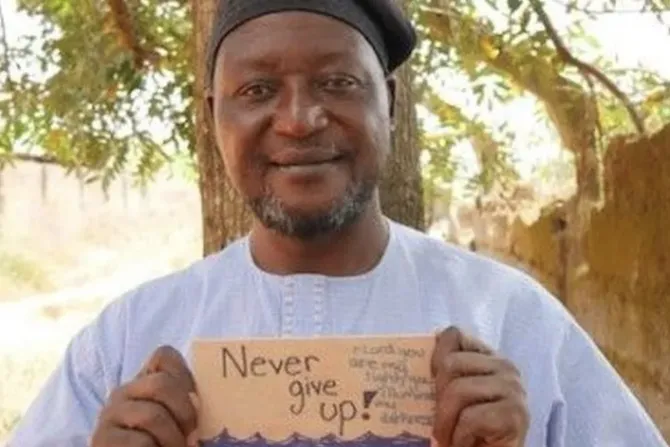Catholic journalist Luka Binniyat will stand trial on charges of “cyberstalking” after reporting on the massacre of Christians in Nigeria. | Christian Solidarity Worldwide (CSW)
A journalist who wrote an article accusing the Nigerian government of failing to protect Christians threatened by armed militants was arrested and will be tried on charges of “cyberstalking.”
Luka Binniyat, a Catholic human rights reporter, is facing prison after writing an article in which the Nigerian government was criticised for its inaction in the face of an ongoing threat to Christian communities.
In the article, Binniyat reported on charges that Kaduna State’s Commissioner of Internal Security and Home Affairs, Samuel Aruwan, had mischaracterised the massacre of unarmed Christians as a “clash” between villagers and herdsmen.
Binniyat is set to stand trial before a Nigerian magistrate on Sept. 6. on charges of cyberstalking, aiding, and abetting the offences of cybercrime, charges which he denies.
Arrested for reporting on massacre
Binniyat told CNA that his arrest was based on a complaint filed by Aruwan, over an article titled, “In Nigeria, Police Decry Massacres as ‘Wicked’ but Make No Arrest,” which was published Oct. 29, 2021, in the Epoch Times.
In the article, Binniyat reported on the mass killings of Christians in two Southern Kaduna villages. In the community of Madamai, 38 Christians were massacred on Sept. 28, 2021, by armed Muslim Fulani herdsmen. A day later, in the Christian village of Jankassa, about three miles south of Madamai, armed herdsmen killed four villagers, according to Binniyat’s report.
The Nigerian official, Aruwan, issued a press statement the following day saying that the violence was the result of “clashes” between local villagers and herdsmen. The statement stirred resentment among Christians both in Southern Kaduna and in other Christian areas in the Middle Belt of Nigeria.
Binniyat quoted a Nigerian senator who disagreed with Aruwan’s assessment that the massacre was a “clash” between villagers and herdsmen.
“The government of Kaduna state is using Samuel Aruwan, a Christian, to cause confusion to cover up the genocide going on in Christian Southern Kaduna by describing the massacre as a ‘clash,’” Senator Danjuma Laah, who represents Southern Kaduna Senatorial Zone in the Nigerian Senate, told Binniyat.
Suppression of the press
The arrest and upcoming trial of Binniyat, are an attempt to silence journalists who speak out about attacks on Christians in Nigeria, says Robert Destro, a law professor at Catholic University and a former Assistant Secretary of State for Democracy, Human Rights, and Labor during the Trump administration.
“No politician likes criticism, but most understand that a reporter’s job is to find the facts and report them honestly,” Destro wrote in an email to Catholic News Agency.
“The stakes go up exponentially when a government is determined to hide the truth about official corruption by crafting an official political narrative or story that refuses even to acknowledge that certain problems exist. Poking holes in such official narratives can get you arrested — or worse,” he said.
Challenging the official “narrative”
Reporters such as Binniyat are challenging the government’s dominant narrative, Destro said.
“In Nigeria, the official ‘narrative’ is that the massacres of Christians in their homes and churches are the result of ‘clashes’ between peaceful cattle-herders who have been displaced from their traditional grazing lands by climate change and farmers who object to their farms, villages, and towns being overrun by cattle,” Destro said.
“The reality is that Christians and other religious groups are attacked, without provocation or warning, by armed militants who kidnap, rape, plunder and kill. By calling these attacks clashes caused by climate change, the government simultaneously blames the victims, absolves the attackers, and has an internationally recognised excuse for doing nothing,” Destro added.
The Nigerian government, he said, rather than simply not protecting Christians, seems to be aiding and abetting the Muslim militant groups attacking them.
“Even a little digging into the facts on the ground shows that the government doesn’t simply turn a blind eye to the violence; it actively favours the attackers, many of whom are from favoured religious (Muslim) and ethnic groups (Fulani),” Destro told CNA.
“When viewed from an ethnic and religious perspective, those murderous rampages through the countryside begin to look a lot like more like an organised land-grab which is designed to push local ethnic and religious groups off their land so that the invaders can control both the land itself and the resources it contains,” Destro added.
“Nigeria’s official narrative – which is parroted by gullible foreign governments like the United States, the UK, and the EU, is that there is nothing to see here but peaceful herders and farmers who are clashing because of climate change,” Destro wrote.
Binniyat and other members of the press need to be able to ask, “who is supporting, financing, and protecting these criminals?” he said.
Journalist fears for his life
Speaking to the press in August after his trial was stayed until Sept. 6, Binniyat said he feared for his life.
“I am clearly a marked man, by the implication of my trial, and I want the Kaduna state government to be held responsible should any harm come to me,” Binniyat said.
Human rights lawyer and Hudson Institute scholar Nina Shea says Binniyat’s arrest reveals the dire state of affairs in Nigeria.
“Kaduna’s Governor [Nasir El Rufai] has abjectly failed in his primary responsibility to protect every citizen in his state, and consequently, we are now seeing a complete breakdown in the rule of law there,” Shea told CNA.
“Instead, he presides over a situation where journalists, like Luca, reporting on lethal violence, are themselves threatened and dragged into court under a cyberstalking law wielded as a weapon by a state official who claims to feel threatened by the news report. Meanwhile, President Buhari stands idly by as large regions of what should be Africa’s most important country are taken over by terrorists, jihadists, and criminals,” she said.
Source: CNA

